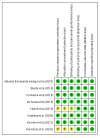Effectiveness of Nurse-Led Heart Failure Self-Care Education on Health Outcomes of Heart Failure Patients: A Systematic Review and Meta-Analysis
- PMID: 32916907
- PMCID: PMC7560014
- DOI: 10.3390/ijerph17186559
Effectiveness of Nurse-Led Heart Failure Self-Care Education on Health Outcomes of Heart Failure Patients: A Systematic Review and Meta-Analysis
Abstract
Poor self-care behaviors can lead to an increase in the risk of adverse health outcomes among patients with heart failure. Although a number of studies have investigated the effectiveness of nurse-led self-care education, the evidence regarding the effects of nurse-led intervention in heart failure remains uncertain. This study aimed to evaluate evidence on the effectiveness of nurse-led heart failure self-care education on health outcomes in patients with heart failure. To identify studies testing nurse-led education designed to improve self-care among heart failure patients, comprehensive search methods were used between January 2000 and October 2019 to systematically search six electronic databases: PubMed, CINAHL, Embase, Cochrane library, Web of Science, and SCOPUS. All the eligible study data elements were independently assessed and analyzed using random-effects meta-analysis methods. Of 612 studies, eight articles were eligible for this study. Nurse-led heart failure self-care education significantly reduced the risk of all-cause readmission (risk ratio (RR) = 0.75, 95% confidence interval (CI) = 0.66-0.85), heart failure specific readmission (RR = 0.60, 95% CI = 0.42-0.85), and all-cause mortality or readmission (RR = 0.71, 95% CI = 0.61-0.82). However, nurse-led heart failure self-care education was not associated with improvements in the quality of life and heart failure knowledge. Studies on the effectiveness of nurse-led heart failure self-care education mostly report only the positive effects on patients' health outcomes, whereas evidence of the effectiveness of the nurse-led approach is still limited. Therefore, high quality randomized controlled trials with detailed and explicit descriptions on the components of the interventions are needed.
Keywords: heart failure; meta-analysis; nursing; self-care; systematic reviews.
Conflict of interest statement
The authors have no conflict of interest to declare.
Figures
Similar articles
-
The effectiveness of psychological interventions on self-care, psychological and health outcomes in patients with chronic heart failure-A systematic review and meta-analysis.Int J Nurs Stud. 2018 Feb;78:16-25. doi: 10.1016/j.ijnurstu.2017.08.006. Epub 2017 Aug 19. Int J Nurs Stud. 2018. PMID: 28935393
-
A systematic review of the effectiveness of nurse coordinated transitioning of care on readmission rates for patients with heart failure.JBI Libr Syst Rev. 2011;9(15):464-490. doi: 10.11124/01938924-201109150-00001. JBI Libr Syst Rev. 2011. PMID: 27820542
-
Effectiveness of avatar-based technology in patient education for improving chronic disease knowledge and self-care behavior: a systematic review.JBI Database System Rev Implement Rep. 2019 Jun;17(6):1101-1129. doi: 10.11124/JBISRIR-2017-003905. JBI Database System Rev Implement Rep. 2019. PMID: 31021975
-
Promoting and supporting self-management for adults living in the community with physical chronic illness: A systematic review of the effectiveness and meaningfulness of the patient-practitioner encounter.JBI Libr Syst Rev. 2009;7(13):492-582. doi: 10.11124/01938924-200907130-00001. JBI Libr Syst Rev. 2009. PMID: 27819974
-
Quality and outcomes of heart failure care in older adults: role of multidisciplinary disease-management programs.J Am Geriatr Soc. 2002 Sep;50(9):1590-3. doi: 10.1046/j.1532-5415.2002.50418.x. J Am Geriatr Soc. 2002. PMID: 12383160
Cited by
-
Associations between Physical Activity, Systemic Inflammation, and Hospital Admissions in Adults with Heart Failure.Cardiopulm Phys Ther J. 2024 Oct;35(4):163-173. doi: 10.1097/cpt.0000000000000254. Cardiopulm Phys Ther J. 2024. PMID: 39544636
-
Knowledge, attitudes, and practices regarding home-based cardiac rehabilitation in patients with chronic heart failure.Sci Rep. 2025 Aug 23;15(1):30991. doi: 10.1038/s41598-025-15350-9. Sci Rep. 2025. PMID: 40846728 Free PMC article.
-
Mapping cognitive function screening instruments for patients with heart failure: A scoping review.Belitung Nurs J. 2024 Jun 28;10(3):240-251. doi: 10.33546/bnj.3165. eCollection 2024. Belitung Nurs J. 2024. PMID: 38947299 Free PMC article.
-
Knowledge about self-efficacy and outcomes in patients with heart failure and reduced ejection fraction.Eur J Heart Fail. 2023 Oct;25(10):1831-1839. doi: 10.1002/ejhf.2944. Epub 2023 Jul 26. Eur J Heart Fail. 2023. PMID: 37369637 Free PMC article.
-
Registered nurse effect on long length of stay in the heart failure hospitalizations of African Americans.PLoS One. 2025 Aug 5;20(8):e0329602. doi: 10.1371/journal.pone.0329602. eCollection 2025. PLoS One. 2025. PMID: 40763128 Free PMC article.
References
-
- Go A.S., Mozaffarian D., Roger V.L., Benjamin E.J., Berry J.D., Blaha M.J., Dai S., Ford E.S., Fox C.S., Franco S., et al. Heart disease and stroke statistics—2014 update: A report from the American Heart Association. Circulation. 2014;129:e28–e292. doi: 10.1161/01.cir.0000441139.02102.80. - DOI - PMC - PubMed
-
- Salahodinkolah M.K., Ganji J., Moghadam S.H., Shafipour V., Jafari H., Salari S. Educational intervention for improving self-care behaviors in patients with heart failure: A narrative review. J. Nurs. Midwifery Sci. 2020;7:60–68. doi: 10.4103/JNMS.JNMS_19_19. - DOI
Publication types
MeSH terms
LinkOut - more resources
Full Text Sources
Medical





